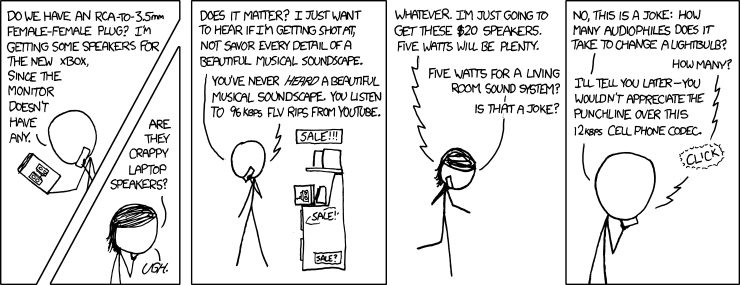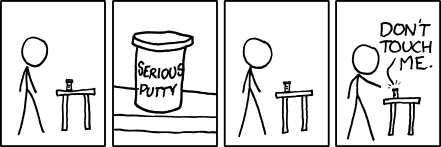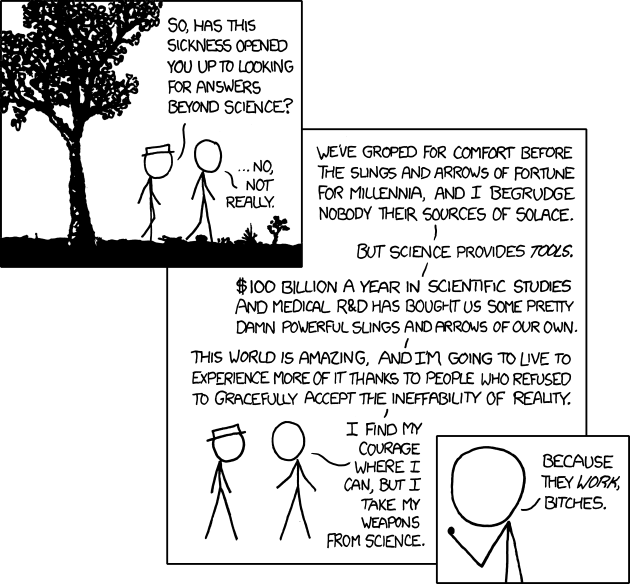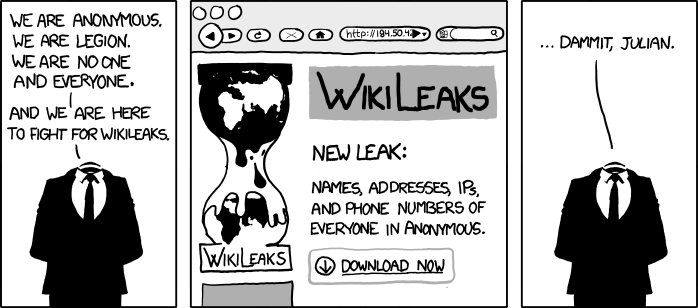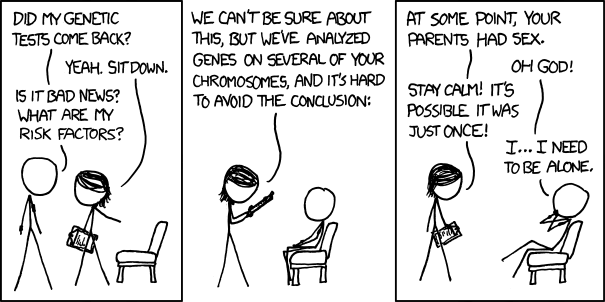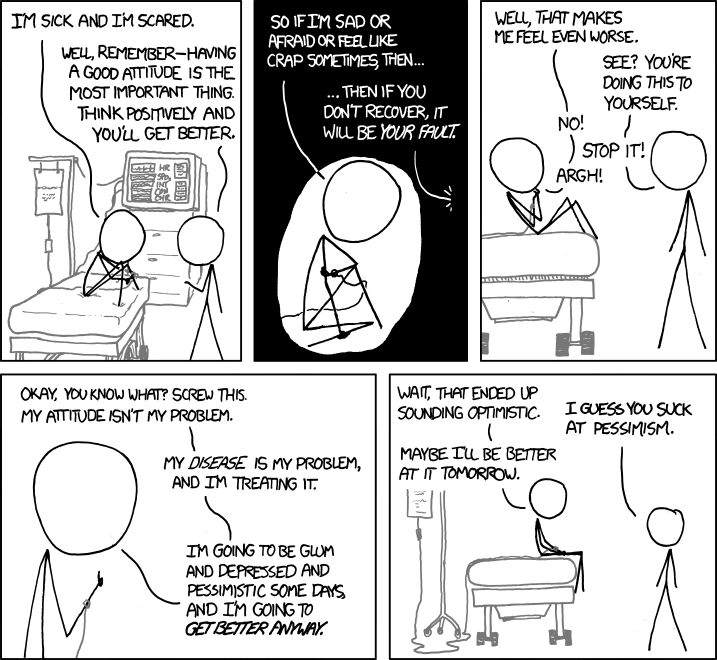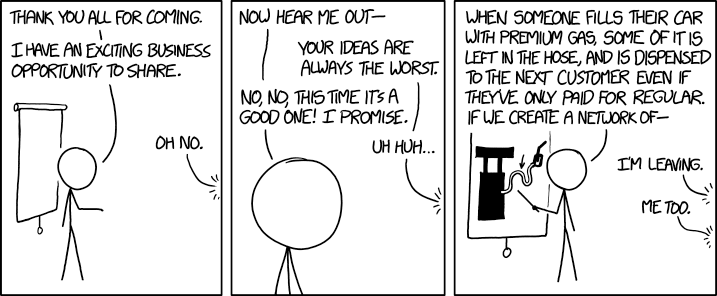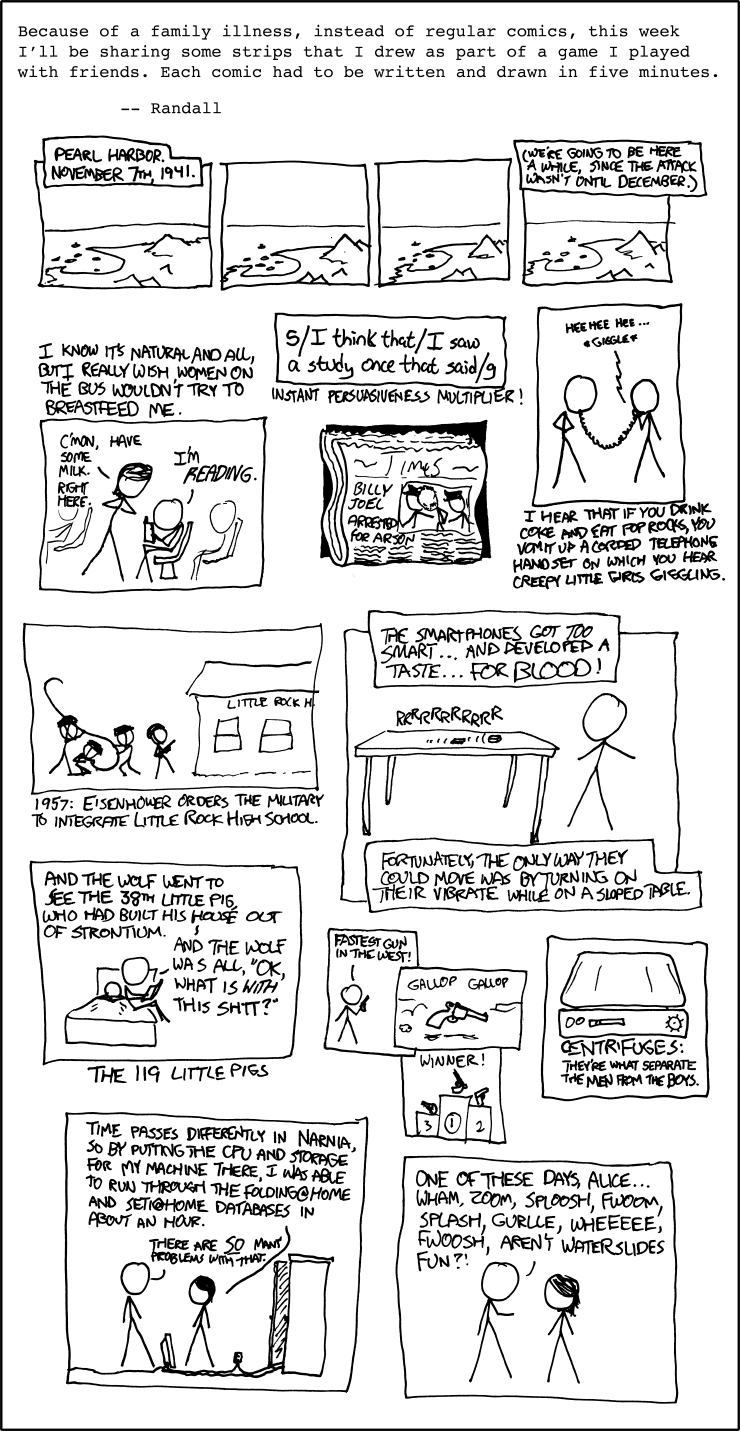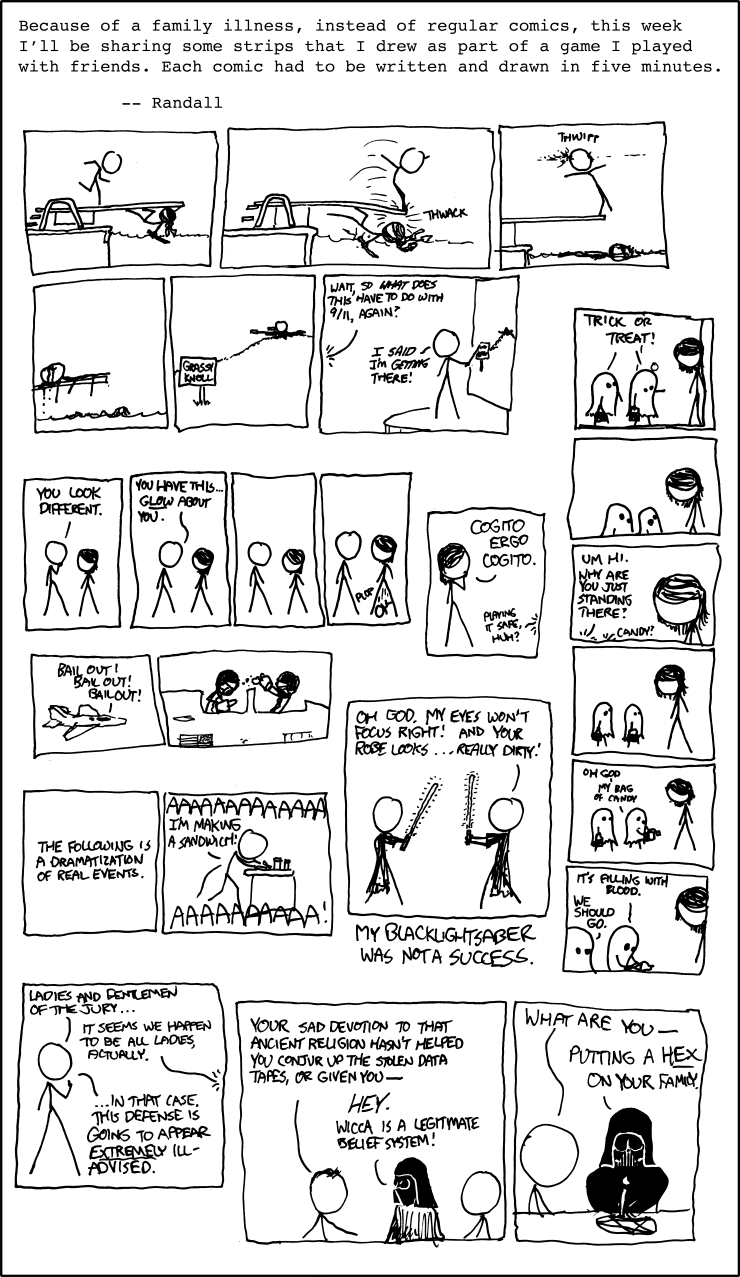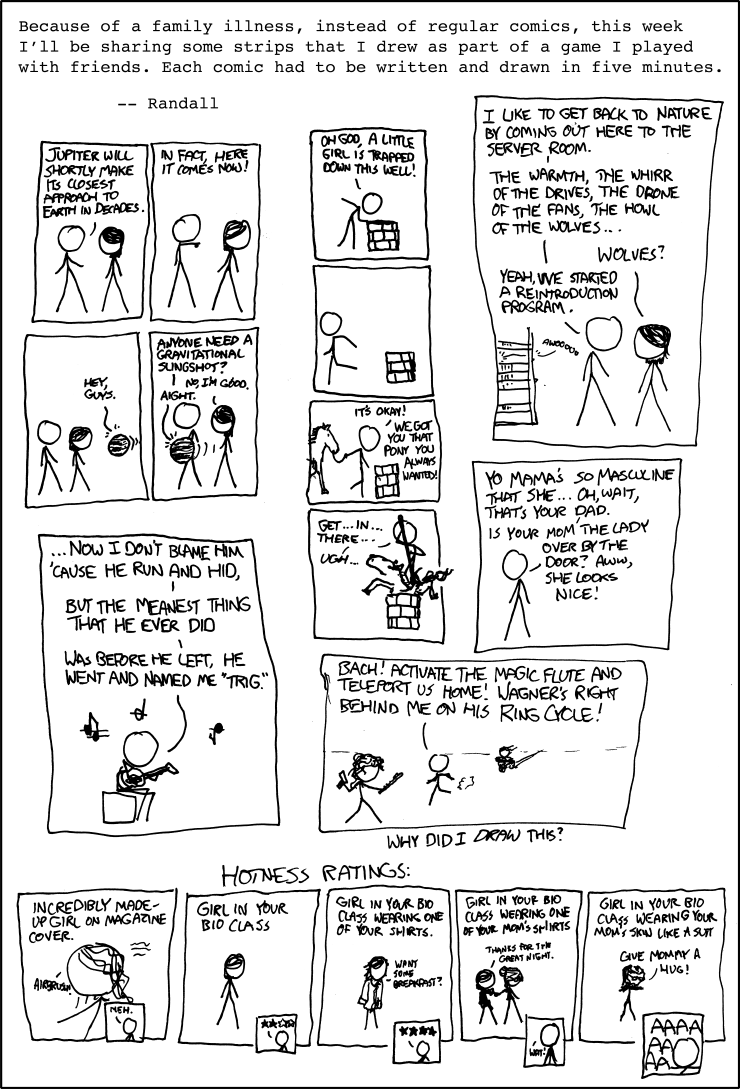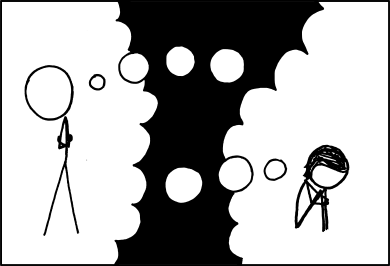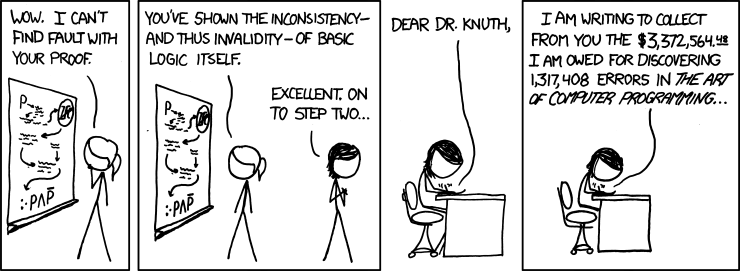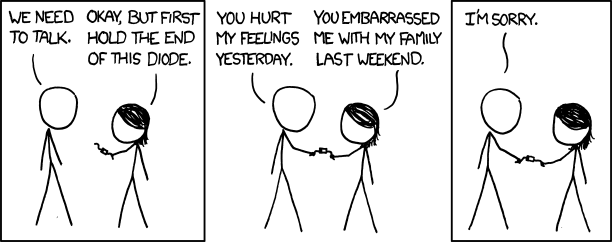[Weekends are so dull when there are no reviews. Fortunately your least favorite hell demon and mine "shufti" has apparently emailed me a review of Randy's short story in the Machine of Death anthology. Which, okay. I strongly recommend reading the story before the review. -Ed.]Warning: there are spoilers in this review. I made no attempt to hide the spoilers, so if you don't have access to a hard copy I would download the (absolutely free!) .pdf for Machine of Death, which is right
here. Randy's story is on page 421.
Okay that's out of the way. MOVING ON TO THE REVIEW!
++++
Here's a list of common complaints for xkcd:
- Poor pacing
- Poor attribution
- Poor characterization
- Poor dialogue
- Poor art
Basically everything, aside from the boxes that surround the comic (which are rather well-done, actually).
Why do I bring this up? Because everything wrong with xkcd (art notwithstanding) is also wrong with Randy's story in
Machine of Death. For those not in the know, Machine of Death is a short story collection framed around the concept of a machine that can predict your death based on a blood sample. The big draw is that most of these stories come from famous webcomic people - Ryan North (who also
came up with the concept), David Malki !, Kris Straub, etc. (Ben Croshaw - of Zero Punctuation fame - also has a story in here). But of course, because the webcomic world is a big in-group where everyone seems to know everyone, Randall Munroe had his story end up in here too. And as I already mentioned, it's
awful.
So, on to the analysis. First off, it's amusingly titled "?", which is only amusing in the context that all the story titles correspond to causes of death the machine spits out. You might think this is Randy being clever, in which case I would point out that, based on xkcd's de-evolution in the past 3-4 years, Randy has undergone extensive surgery to have all the clever purged from his body. I would also point out that Randy originally submitted the story with the title "Murder". Take from that what you will.
As the title would indicate, the story is about bucking a trend. Fair enough; several of the stories make it a point to indicate that the machine has had a sizable impact on society (in one story, its introduction in Britain led to the minimum voting age being lowered to 14 and the election of a 17-year-old Prime Minister). You can't expect everyone to be happy about it. The problem is that Randy does it in the most annoying, pretentious, faux-nerdy way possible.
However, before I can get to that, I have to get past the first sentence, and Lord, does that raise its own issues. The story starts off with the line: "He had not read his slip of paper," and the first time I read this I knew that I was in for some pain.
Let me explain: I really strongly dislike when a writer misses out on opportunities to use contractions. That may seem like a small detail to a lot of you, but little things make or break stories. You mentally stumble over a phrase here, a word there, and suddenly your immersion is broken because you're trying to make sense of what the writer is saying instead of just enjoying the story. The disruption of flow can, potentially, ruin the experience, which is why, when it comes to writing, it's so important to know, at least in general, how people communicate and think. For proof, re-read that last sentence. It's fucking awful; the overuse of commas (and subordinate clauses) "stutters" the sentence in your head, making it unnecessarily hard to understand. If I had just said: "The disruption of flow can potentially ruin the experience, which why it's so important that writers know, at least in general, how people communicate and think," it would have been a much better sentence. Likewise, when Randy missed out on using that contraction, he missed out on improving the flow of his sentence. It comes down to knowing not just the rules of grammar but also how that grammar
sounds and
feels; this is what separates writers from non-writers, and perhaps more importantly, what separates average writers from great ones.
The rest of the story follows suit - grammatically, everything is "just fine", but it's all slightly disconnected. He doesn't use many
modifiers, which is the main problem; he prefers to use a multitude of main clauses to deliver his message. The disconnected feel could work thematically, especially since the main character is supposedly mentally unhinged, but it's still annoying to read. In the end, I suppose whether or not you're fine with that depends on whether you're willing to accept this as a good paragraph:
"There was no answer. He reached the car. It was a Chevy Nova with no glass in the back window. He had bought it for $300, cash."
I, personally, am not.
"So where is he driving?" you might ask, conveniently picking out from the quoted paragraph the one question that would allow me to segue back to my first point regarding the plot. Well, very generally, he's driving from place to place setting forest fires. He's doing this because, apparently, this is what happens when you answer the "dangerous question" asked in the story's synopsis: "what happens when physical science rejects the idea of precognition?' Yep, according to Randy, the Machine of Death is "unnatural" and not "science". Some quotes:
"You can't just say what's going to happen ahead of time. That's not how physical law works. That's narrative. And when reality is twisted to fit narrative, that's not natural. That's someone making stories happen."
"Physics works by saying that if you set things up like so, this is what will happen. Curses say that no matter how you set things up, this is what will happen."
So, putting aside the fact that he's going dangerously meta with his argument, he's making two mistakes here. The first, and lesser, mistake is that he's conflating Physics with Physical Law, something that I would think someone who worked for NASA wouldn't do. Here's something off the Wikipedia page for Physical Law:
"[...]Nor should 'physical law' be confused with 'law of physics' - the term 'physical law' usually covers laws in other sciences (e.g. biology) as well."
The second problem is that no, this *is* science. In fact, at its core it is the very
definition of science. The machine states a falsifiable hypothesis (you will die in X fashion) which you can test via observation (whether the person died as the machine predicted). From this we can draw a conclusion (the machine can/cannot predict death). Hopefully other people will test this hypothesis for themselves so there can be peer approval. That's the scientific method in a nutshell. Even a dummy English major like me can get that one right.
Randy The narrator seems upset that the methodology is unclear but that isn't a good enough excuse because it conveniently forgets that several major theories accepted as "fact" and "science" (gravity, light acting as a wave and a particle, etc.) are still not fully understood.
"I never expected an answer[...]I was at peace with an uncaring universe. So what the hell is this all about? For the first time, a chance at some answers, and you're playing games?"
Translation: "Boo hoo, I'm forced to reconsider my views in light of new evidence. THIS ISN'T SCIENCE!"
God, this is insufferable. It's a shame that I, an unwashed plebe, am caring more about the rigor of his views on science than he is. Maybe he's doing this on purpose, but I don't think it excuses him. For
better or worse he's looked to as a bit of an authority in the areas of science; when he says something in the context of science many people will take him at face value. And why not? He has a degree in physics, he's worked in the scientific field; he has experience on his side and many people will trust that experience. As such, he has an intellectual duty to be as straightforward as possible in that regard so as to not accidentally mislead his audience. I'm afraid that many people are going to walk away from this with a misshapen view of what science is all about - it's not, as he's saying, about accepting something because you know why it happens. Science is about observing something happening and
then trying to find out why. If he were truly a scientist he wouldn't be whining that his outlook on life was being challenged, he would accept that the machine works, and then he would be trying to figure out how or why the machine worked, or what it means practically (incidentally, that latter statement is explored in Ryan North's
vastly superior story "Murder and Suicide, Respectively". For the record, when Ryan North went for his master's degree he specialized in computational linguistics, a field Randy has
openly mocked. I think we can say that Ryan North is, on the scale of Decent Human Beings, several magnitudes greater than Randy).
The more I think about and read this story, the more wrong pops out of it. There's wrong in nearly everything he does and says. For instance: the narrator is talking to someone the whole time, but he doesn't make it explicitly clear who he's talking to until midway through the story. That's bad form. It's needless obfuscation. Just make it clear he's addressing an abstract entity rather than string us along for no good reason.
Or how about this little gem:
"He pulled out onto the freeway, and settled the speedometer at seventy.[...]In any event, the car wouldn't go faster."
Well, Randy, you are not "settling" your car at seventy; you're redlining it. There's a big difference.
Then there's this nugget:
"In elementary school," he said, after a time, "kids would come up to you and ask the question, 'Are you P.T.?' It was a trick question, of course. If you said yes, they called you a pregnant teenager. If you said no, they'd say you weren't potty-trained. All you could do was reject the question. You could even," he added conversationally, "punch the kid in the mouth when he asked."
Punch him in the mouth. Violence will solve everything.
*Sigh*
Outside of the incredible achievement of managing to write legibly, there's nothing here that he does right. Absolutely nothing.
"[...]I'm done searching halfheartedly for answers. I have your attention, across whatever space and time separates us. Whatever is going to happen to me can happen here. I'm not moving to eat or drink. If that's the way you've decided it will happen, then I guess that's the way it will happen. But it's your decision, not mine.[...]But if you have even a bit of honesty in you, the paper in my pocket doesn't say 'SUICIDE.' It says 'MURDER'."
Just shut up. Just be quiet.
There are many reasons to buy Machine of Death, but Randy's story is most definitely not one of them.
[I really wanted to like this story, because I've long premised many of my posts and comments on this blog on the premise that Randy would do better if only he wasn't writing XKCD. That the format of XKCD--its lack of structure, its reliance on his shitty art to tell a story, the rut into which Randy has driven himself--was what was limiting him from achieving something that didn't suck. This story proves me wrong--it manages to be one of the most annoying short stories I've ever had the misfortune to read. And there's all these little details that make it so much worse. -Ed.]
